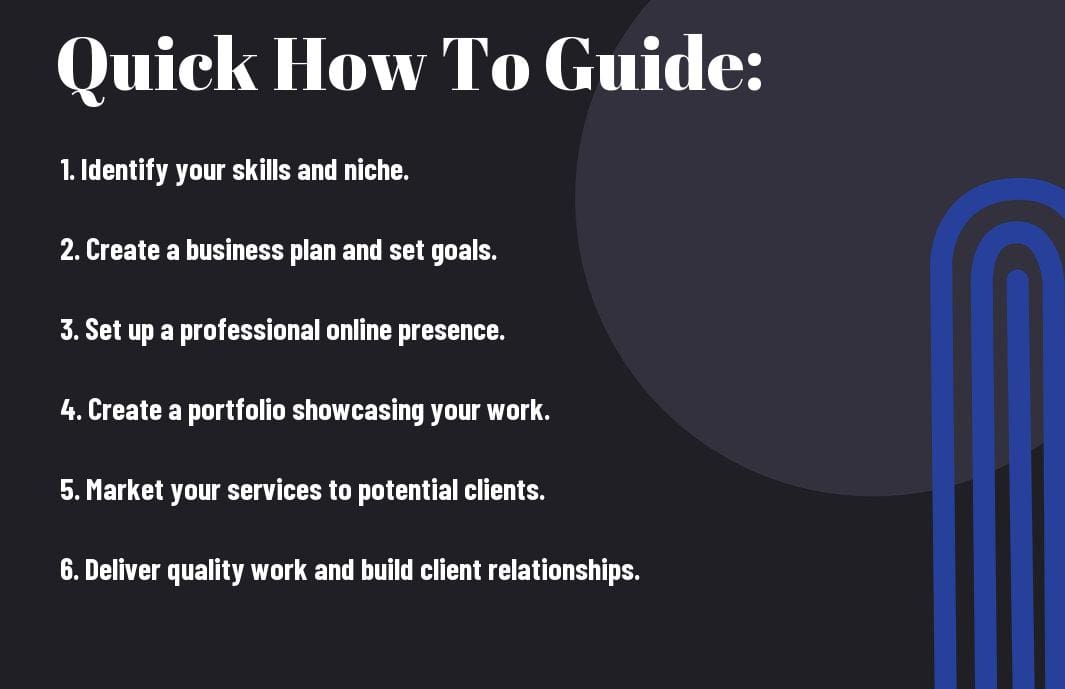Just stepping into the world of freelancing can be overwhelming, but with the right guidance and determination, you can pave your path to success. This comprehensive guide will walk you through all the crucial steps you need to take to start your freelance business from scratch and thrive in the competitive market. From defining your niche and setting up a business structure to creating a standout portfolio and finding your first clients, each section is packed with valuable tips and actionable advice to help you kickstart your freelance career on the right foot. Whether you are a seasoned professional looking to transition into freelancing full-time or a newcomer exploring the flexibility of self-employment, this guide is your roadmap to building a successful freelance business from the ground up.
Key Takeaways:
- Find Your Niche: Identify your specific skill set and passion to determine the services you will offer as a freelance business owner.
- Create a Strong Brand: Develop a professional brand image including a logo, website, and social media presence to attract clients and stand out in the crowded freelance market.
- Build a Strong Network: Networking is crucial for freelancers. Attend events, join online communities, and reach out to potential clients to build strong relationships and grow your business.

Laying the Foundations
Identifying Your Marketable Skills
Little do many realize that their unique combination of skills and experiences can be a gold mine in the world of freelance business. You possess knowledge and talents that are valuable to others. Take some time to identify what you excel at and what sets you apart from the competition. Maybe you are a whiz at graphic design, a social media maven, or a skilled writer. Knowing your strengths is crucial in establishing a successful freelance business.
Setting Your Freelance Business Goals
Clearly defining your freelance business goals is the first step towards turning your dreams into reality. You need to establish what you want to achieve with your business, whether it’s financial independence, flexibility in your work schedule, or building a reputable brand. Setting specific, measurable, achievable, relevant, and time-bound (SMART) goals will guide you in mapping out your journey towards success.
The key to setting your freelance business goals is to be specific and realistic. Set milestones that you can track and measure your progress against. Additionally, identify potential challenges and have contingency plans in place to overcome them. Your goals should motivate and drive you towards reaching new heights in your freelance business.

Legal and Administrative Setup
How to Register Your Business
Keep in mind that the first step in starting a freelance business is to register it legally. You can choose to operate as a sole proprietorship, LLC, or corporation depending on your needs. Check with your local government authorities to understand the requirements for registration and obtain any necessary licenses or permits. This ensures that your business is recognized and operates within the legal framework.
Managing Finances: Tips for Tracking Income and Expenses
Even as a freelancer, it is crucial to maintain a clear record of your income and expenses to stay organized and compliant with tax regulations. Use accounting software or tools to track your finances regularly. Set aside a portion of your income for taxes and create a system to categorize and track expenses for better financial management.
While tracking your income and expenses, consider utilizing separate accounts for your business and personal finances to maintain clarity and streamline the process. Separating your business finances can help you track your cash flow more effectively and ensure accurate financial reporting. Keep all receipts and invoices organized for easy reference when filing taxes. Knowing where your money is coming from and where it is going is imperative for making informed financial decisions in your freelance business.
Building Your Brand and Online Presence
Creating a Professional Portfolio
Once again, when starting a freelance business, building a professional portfolio is crucial. Your portfolio should showcase your best work and highlight your skills and expertise. Clearly organize your portfolio, including a variety of projects that demonstrate your range as a freelancer. Make sure to update it regularly with your latest work to impress potential clients.
Establishing Social Media and Networking Strategies
Even in the freelance world, social media presence and networking are crucial for building your brand and attracting clients. Create profiles on key platforms like LinkedIn, Instagram, and Twitter to showcase your work and connect with potential clients. Engage with your audience by sharing industry insights, participating in relevant conversations, and networking with other professionals in your field.
Brand yourself consistently across all platforms to establish a strong online presence. Utilize social media tools to schedule posts, monitor engagement, and track your progress. Networking events, both online and in person, can help you expand your professional circle and gain valuable connections for your freelance business.
Attracting Clients
Crafting Effective Proposals and Pitches
Now, when it comes to attracting clients to your freelance business, the first step is to craft effective proposals and pitches. Your proposal should be tailored to each client, highlighting how your services can specifically meet their needs. Make sure to showcase your expertise, relevant experience, and how you can bring value to their project.
Pricing Your Services: Factors to Consider
Now, pricing your services is a crucial aspect of attracting clients. Before setting your rates, consider factors such as your experience, industry standards, project complexity, and the value you provide. It’s important to strike a balance between setting a competitive price that reflects your worth and being attractive to potential clients.
- Experience level: Expertise
- Industry standards: Market
- Project complexity: Scope
- Value provided: Benefit
Factors like your experience level, industry standards, project complexity, and the value you bring to the table are crucial in determining your pricing strategy. Be mindful of, setting the right price can help you attract the right clients and build a sustainable freelance business. After considering these factors, you can confidently set your rates and communicate them effectively to potential clients.
Managing Your Projects
Tips for Efficient Workflow
Unlike traditional office settings, freelancers need to be disciplined in managing their time and projects efficiently. To ensure a smooth workflow, consider these tips:
- Set clear goals and deadlines for each project to stay on track.
- Use project management tools like Trello or Asana to organize tasks and timelines.
- Communicate regularly with clients to provide updates and seek feedback.
- Prioritize tasks based on deadlines and importance to avoid last-minute rushes.
Knowing how to prioritize your tasks and stay organized is key to successfully managing multiple projects.
Maintaining Client Relationships and Communication
Some of the most successful freelancers excel not just in their work, but also in fostering strong relationships with clients. Maintaining client relationships is crucial for repeat business and referrals. Regular communication, delivering high-quality work, and being responsive to feedback are important in building trust and credibility with clients.
The ability to communicate effectively and manage client expectations can set you apart from competitors and lead to long-term partnerships.
Growing Your Freelance Business
Scaling Your Services
To scale your services as a freelancer, start by identifying your most profitable and in-demand offerings. Consider expanding your service offerings to cater to a wider audience or higher-end clients. Increase efficiency by streamlining your processes and outsourcing tasks that can be done by others. Any growth should be gradual to ensure quality is maintained and clients are happy with the expanded services.
Diversifying Income Streams and Finding New Opportunities
Scaling your freelance business involves more than just offering additional services. Diversifying income streams is crucial to withstand fluctuations in demand or industry changes. Look for new opportunities in related fields or industries where your skills can be applied. Keep an eye out for trends and emerging markets where your expertise can bring value. By exploring new avenues, you can reduce the risk of relying too heavily on one type of client or service.
Summing up
With these considerations in mind, starting a freelance business from scratch can be a rewarding venture with the right mindset, planning, and execution. It’s vital to focus on your niche, build a strong brand, set clear goals, manage finances wisely, and consistently market your services to attract clients. By following this ultimate guide, you will be equipped with the knowledge and tools needed to begin on a successful freelance journey. Be mindful of, patience and persistence are key as you establish your presence in the competitive freelance industry. Good luck on your entrepreneurial endeavors!
FAQ
Q: What are the key steps to start a freelance business from scratch?
A: To start a freelance business from scratch, you need to follow these key steps:
- Identify Your Skills and Niche
- Create a Business Plan
- Set Up Your Business Structure
- Build a Portfolio
- Set Your Pricing and Payment Terms
- Market Your Services
- Network and Build Relationships
- Deliver High-Quality Work
Q: How can I find clients for my freelance business?
A: Finding clients for your freelance business can be done through various methods:
- Utilize Freelance Platforms such as Upwork, Freelancer, and Fiverr
- Networking at Events, Conferences, and Meetups
- Utilize Social Media Platforms to Showcase Your Work and Reach Out to Potential Clients
- Ask for Referrals from Previous Clients or Contacts
- Cold Emailing Potential Clients with a Personalized Pitch
- Collaborate with Other Freelancers or Agencies for Referrals
Q: How can I ensure success in my freelance business?
A: To ensure success in your freelance business, you should:
- Deliver High-Quality Work and Exceed Client Expectations
- Communicate Clearly and Promptly with Clients
- Manage Your Finances Efficiently and Save for Taxes
- Constantly Up-skill and Stay Updated with Industry Trends
- Set Boundaries with Clients to Maintain a Healthy Work-Life Balance
- Seek Feedback from Clients to Improve Your Services
- Stay Organized with Project Management Tools and Schedules




